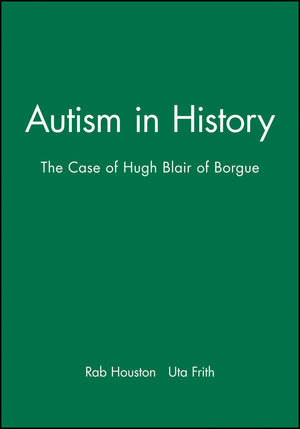Autism in History: The Case of Hugh Blair of BorgueISBN: 978-0-631-22089-3
Paperback
224 pages
December 2000, Wiley-Blackwell
 This is a Print-on-Demand title. It will be printed specifically to fill your order. Please allow an additional 10-15 days delivery time. The book is not returnable.
|
||||||
"I found this book utterly absorbing and utterly convincing. The richness of historical detail - testimonies and actual interrogations - and its telling hold one like a novel. The minute sifting of the evidence is in the best historico-clinical tradition, weighing everything carefully, never overstating or pushing. The interest spreads in all directions - about the way the law, the culture, and ordinary people thought of mental incapacity or madness in the eighteenth century. I think Autism in History will be extremely valuable in many different ways." Oliver Sacks M.D. Author of Awakenings
"The authors guide us through the case with an expert hand, in a book written for a wide range of non-specialist readers. What's more, the book constitutes a unique introduction to autism, presenting both its scientific and clinical aspects, as well as the person and their social circumstances. A stimulating read." Infancia y Aprendizaje, vol 24(2), 2001.
"Rab Houston and Uta Frith provide a splendid case study of probably autism from eighteenth-century Scotland. Houston and Frith are to be congratulated in their synthesis of the evidence for Hugh Blair of Borgue being a case of autism in history. They have done so in a manner and style that is as cautious as it is thorough." Stephen Jones, Norfolk Mental Health Care Trust, Social History of Medicine, vol 14 (2), 2001.
"This is a fascinating book." RH Campbell, Transactions, Vol 75, 2001
"In presenting Hugh Blair, a member of the landowning class in eighteenth-century Scotland, Autism in History demonstrates a refreshing lack of squeamishness ... Although Houston and Frith conclude confidently that they are looking at a case of the same condition we now call autism, they remain sensitive to the ways that historical conditions could influence the perception or presentation of the disorder. In addition, Houston and Frith amass convincing data to show that Blair was, in fact, autistic. It might be possible to quibble with their retrospective diagnosis, but they make a highly plausible case." Jonathan Sadowsky, Castele Associate Professor of Medical History, Case Western Reserve University, Journal of the History of the Behavioural Sciences, Fall 2003



